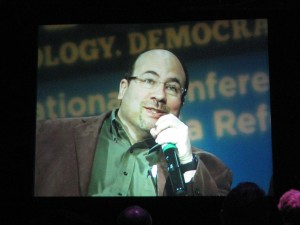Yesterday, April 29th, I witnessed people being great.
Returning along Highway 50 from Jefferson City Missouri, I was passing through Osage County when I spotted a dumped motorcycle to my left. The bike—a newish gold something-or-other—lay on its side, trailing a scatter of broken parts back to a man who was on knees and elbows, clearly hurt.
A FedEx truck was ahead of my. I pulled over just behind it. A house was directly across the two-lane from us. People were in the yard. The FedEx driver sprinted to the house to tell the folks about the accident. I ran toward the man.
By the time I reached him two more cars had stopped and a group of people converged on him. He had gotten to the grass and rolled over. A bloody mess, at first glance he looked in very bad shape. He was still wearing his helmet, moaning and trying, ineffectively, to take it off. He kept saying “I can’t breathe…”
An older man had his cell phone out, dialing 911. A woman, who seemed to have some training, possibly a nurse, helped him unstrap the helmet and pull it gently off, whereupon he lay on his back, legs pulled up, arms sort of help up, covered in blood. The “nurse” cautioned him not to move. Someone else had brought a plastic sheet, which she directed a couple people to hold above him to shield his head from the sun.
I started asking questions—”Can you feel everything?”
“Oh, yeah,” he said, “everything hurts.”
“No tingling?” No. “Open your eyes and look at me.” His pupils looked normal, but that’s not always a reliable telltale.
“Oh, I didn’t hit my head,” he said. “Everything else, but not my head.”
I looked at his helmet. “Your helmet says otherwise,” I told him. Half of it was badly dented and scraped all along the faceplate.
“What happened?” someone else asked.
“I think a blow-out,” he said. “I tried to hang onto it and slow it down…”
I went over to the bike. By now about eight people were there, two semis parked along the highway. One man was doing a good job of directing traffic through the momentarily constricted access. More cell phones were out.
The debris appeared to be all peripherals—mirrors, plastic molding, packs of cigarettes, a cassette tape, mangled sunglasses. The rear tire was missing a long chunk of tread where it had blown. He was lucky in that it was the rear tire. If the front had blown he would have lost it immediately, at sixty-plus miles per hour, but there were no skid marks. He’d managed to slow it down a lot before it dumped and he’d dumped it on the shoulder.
When I returned to tell him this, ambulances were on the way. He was laying on a rock and wanted to move off of it, but everyone kept him in place, not knowing what else might be broken. He was coherent. He was a good rider, evidently, and had controlled the spill marvelously from what I could see.
The ambulance arrived, along with a truck from the local fire department. The crow began to disperse. As one of the trucks started rolling, the driver tossed the man directing traffic one of those bright orange and yellow safety vests.
With nothing more to do (and having done almost nothing anyway) I took my leave. Traffic was slowed and obeying what I now saw were two men, one on each side of the slight hill where all this was occurring, directing. Those who had done whatever they could have and no longer needed to be there were starting their vehicles and moving out in an orderly manner.
All those people had seemed to appear out of nowhere, and very fast, and just did this thing. They helped, if only by being willing to stop. It felt very good to be a human just then.
 At the NCMR, Newmark remarked that craigconnects is going to be a work in progress and that he has made a 20 year commitment to see how far he can take it.
Hearing about craigconnects reminds me of an organization a friend recently told me about: Kiva. If you would like to help someone out with a micro-loan, Kiva is a great place to get you connected.
At the NCMR, Newmark remarked that craigconnects is going to be a work in progress and that he has made a 20 year commitment to see how far he can take it.
Hearing about craigconnects reminds me of an organization a friend recently told me about: Kiva. If you would like to help someone out with a micro-loan, Kiva is a great place to get you connected.

